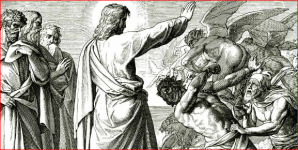
After my series on the parables, I found I was drawn to look into the miracles of Jesus in the Gospels. I have never studies the mighty works of Jesus as a focused effort before and am looking forward to finding nuggets of truth that we can be encouraged by.
I have provided a general introduction, with an opportunity to download two files for your reference in my initial post Signs and Mighty Works of Jesus – Introduction. I found that the format I used for the parable posts were useful to keep me on track, and will continue to use them for this series, with some minor tweaks.
With that said, let’s take a look at our third mighty work of Jesus
Jesus Drives Out an Evil Spirit
Mark 1:21-27
And they went into Capernaum, and immediately on the Sabbath he entered the synagogue and was teaching. And they were astonished at his teaching, for he taught them as one who had authority, and not as the scribes. And immediately there was in their synagogue a man with an unclean spirit. And he cried out, “What have you to do with us, Jesus of Nazareth? Have you come to destroy us? I know who you are–the Holy One of God.” But Jesus rebuked him, saying, “Be silent, and come out of him!” And the unclean spirit, convulsing him and crying out with a loud voice, came out of him. And they were all amazed, so that they questioned among themselves, saying, “What is this? A new teaching with authority! He commands even the unclean spirits, and they obey him.”
Luke also provides a record of this mighty work.
Luke 4:31-36
And he went down to Capernaum, a city of Galilee. And he was teaching them on the Sabbath, and they were astonished at his teaching, for his word possessed authority. And in the synagogue there was a man who had the spirit of an unclean demon, and he cried out with a loud voice, “Ha! What have you to do with us, Jesus of Nazareth? Have you come to destroy us? I know who you are–the Holy One of God.” But Jesus rebuked him, saying, “Be silent and come out of him!” And when the demon had thrown him down in their midst, he came out of him, having done him no harm. And they were all amazed and said to one another, “What is this word? For with authority and power he commands the unclean spirits, and they come out!”
General Observations
Two items in this passage jump out to me.
First, this passage is about authority. The authority of Jesus in His words and works. Both the words of Jesus, in His teaching, and the actions He takes in His healing of this demoniac demonstrate that this humble rabbi is much more than a humble rabbi.
Secondly, as a young believer, this passage caused me a bit of confusion. If the possessed man is speaking the truth, why would the Lord of truth rebuke him and tell him to be silent?
Questions to Consider
Who were the audience?
Of course, the disciples were present. Additional witnesses this this mighty work would include those who were in the audience, observant Jews, in synagogue for the sabbath, seeking to obey God’s call on their life.
Little did they know that God was going to show up that day!
When did the Lord perform this miracle?
See https://www.bibletimelines.net/timelines/jesus-ministry
Where did the Lord perform this miracle?
See Signs and Mighty Works of Jesus – Introduction for downloadable reference file.
Why did the Lord perform this miracle?
A difficult question, for He may have simply sought to rescue this demon possessed man, or at the least remove the this disturbance in the synagogue. After all, the synagogue was a sanctified building!
I think the last phrase gives us a hint as to the reason this mighty work was performed, for the miracle supported the authority of His words, giving those who heard Him an encouragement to follow Him, or conversely, a reason to persecute Him. How often it is that it is either the one or the other.
Notice the first reference of authority in this passage, where the audience speaks of the Lord teaching “as One who had authority”, that He was not referring to other men’s teaching as the scribes would. It was common practice for the average scribe to depend on past authorities, men who had also depended on past authorities.
We know that Jesus depended on the Word of God for His foundation of teaching, and His interpretation of the Old Testament Scriptures continually shocked His audience. The issue of Him not depending on past teachers, and being in sync (fully) with the Old Testament, must have been shocking to His audience.

When He performed His mighty work, this dependence on the singular Word of God, this “teaching as one who had authority”, was reinforced, and the opinion of the audience changed. This teaching was with authority! He didn’t simply appear to be “One who had authority”, but this rabbi possessed authority!
As my momma used to say, He walked the talk!
What was the message for the original audience?
The message for the original audience was that the One who was present had authority, not like the scribes, not like the teachers of the day, not like anyone else.
Thinking about this might work, it provided a number of messages to the original audience. As mentioned , those in attendance changed their opinion of the Masters teaching and ministry. They saw proof of His authority, and were not simply surprised. Mark 1:22 & Luke 4:32 both speak of His audience being “astonished” at His teaching. This word speaks of being struck with amazement. Of being shocked, even to a point of panic.
After the mighty work was performed, both writers used a different term, a term that describes the effect of the miracle to include fear. The audience were amazed at this miracle, and that amazement included the element of fear. The audience was frightened.
Of course, having a demoniac enter the sanctified area of a synagogue would be frightening to the average attendant. One who had greater authority than the demon would also incur greater fear. Who was this Rabbi?
What is the message for us today?
Who do you consider authoritative? I have spent much of my life referring to commentaries for understanding the words of Scripture, and I am thankful for the teaching they have provided. The teaching of the saints are a treasure trove of learning.

The issue is that I need to consider the teaching of past and present saints for what it is, and that the only real authority is the Lord Jesus. We are not to fall into the same trap that the scribes fell into, and that is they “depended” on past teachers, that “depended” on past teachers, that “depended” on past teachers. The source of the “teaching” was lost in dilution and the teaching being provided to the masses became a monster on it’s own.
To simply read, study, memorize and seek to understand the Living Word is one of the greatest challenges a present saint can venture into. To be sure, to seek to depend only on the Word is full of pitfalls and will induce periods of uncertainty, since we may find truths in the Word that go against our current denominational stance.
Fear not, study and search the Scripture and stand on the Word, gracefully speaking the truth in love. Finding truth from the Word and bellowing it out to all in an attitude of pride and arrogance is one of the pitfalls I can attest to. I need to constantly remind myself to walk humbly with the Lord, and exercise mercy and love towards those I am privileged to rub shoulders with.
One other truth is important, and I referred to earlier as an issue of confusion for myself as a young believer. Why would the Lord stop the declaration of the demoniac’s message.
Is not Jesus the Holy One of God? Did He not come to destroy the power of the devil? Of course these statements are true. So why did the Master command this man to be silent?
Was it too early for this truth to come out? Jesus had earlier visited Samaria, and had openly identified Himself to the woman at the well. The truth of Jesus identity had been given out to the Samaritans by this time.
Ok, so was it the audience, faithful Jews, that were not be be informed of this fact at this time? Was it too early for the religious Jew to hear the truth? Again, I am not convinced this was the reason, for at the baptism of Jesus, a voice from heaven revealed that this humble rabbi was God’s beloved Son.
So why did the Master tell this demoniac to shut up? A wonderful message needs a clean vessel to come from.
Therefore, if anyone cleanses himself from what is dishonorable, he will be a vessel for honorable use, set apart as holy, useful to the master of the house, ready for every good work. – 2 Timothy 2:21
Although the truth came out of this demoniac, it actually damaged the message, in that all knew the demoniac was of the dark side, associated with violence, fear, lies and hatred. The message of the Lord Jesus is not to be associated with these characteristics. This is a great challenge for us who seek to represent our Lord Jesus properly.
A corollary truth also comes out of this for myself, in that I have fallen in my walk with the Lord far to often. But it is important to realize that a clean vessel does not equal a perfect vessel, or a vessel that does not need cleaning occasionally.

To be a clean vessel includes the concept of continual cleansing, as our passage in 2 Timothy informs us. Spend some time today alone with Him, and as the Lord speaks to you of areas in your life that are in opposition to His will, confess this sin, and if necessary, go to the one who you may have a strained relationship with, ask forgiveness, and seek to restore your peace with them, (if possible). Exercise humility, and a spirit of meekness, which is required for the believer to imitate, since the Master Himself is gentle and lowly in heart.
Take my yoke upon you, and learn from me, for I am gentle and lowly in heart, and you will find rest for your souls. – Matthew 11:29 ESV
A doctrinally pure message out of a defiled (proud) vessel may actually be an affront to our Master. Consider!
Thanks again for coming to visit. I hope you found something of interest in this post and would appreciate a comment, to begin a discussion.
LOLGB??
LikeLike
Yes indeed. What day did Jesus do the Father’s will? The same first full day of Adam and Eve’s existance. Adam was creaed late afternoon on the sixth day, then Eve after he named the beasts of the field and no help mate was found for him. Then on the eve (beginning) of the seventh day, The Lord rested and instructed his creation, male and female, he instructed them. LOLGB+
LikeLike
LOLGB+??
LikeLike
Lots of Love God Bless Plus > It has a story. To make it short, it was the last thing I said in a debate on Facebook with a female LBGT woman married to another woman. I concluded my final reply with LOLGB+ (Lots of love God Bless Plus > We straight Homophobes can use letters of the alphabet and mathematical signs too!) Waited for a while. Never heard back from her. Must have got the last word. Ha! Kind of stuck. It’s like a sign off handle now. You’re only the second person to ask in little over a year of using it.
She had asked the question “What do you have against LBGT people and leave God out of it.” I proceeded to say how they are not creative and can not come up with their own terminology. Stole the word “Gay” and changed the definition ruining the Flintstones for me. Stole the word “Marriage” and changed its definition… No originality!… Then she invoked God in the debate! Called her a hypocrite…. Only doing as she asked…. Back and forth…. Guess I got in the last word. Man that was a while back. Thanks for asking.
LikeLike